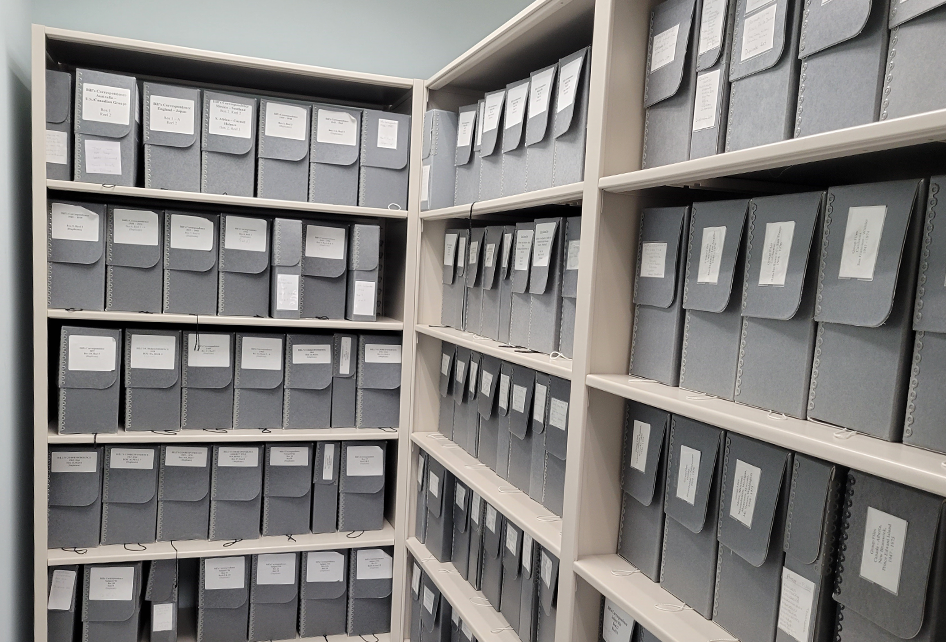A.A. members and those interested in A.A. can access the materials in the GSO Archives for research. Historians, sociologists and other professionals can explore A.A.'s history and growth. Some of our materials date back to the earliest days of A.A.
Archives Center
Published Material
In most cases, the Archives staff can provide access to published information. This may include items such as:
- books
- newsletters
- magazines
- pamphlets
- service pieces
- reports
Unpublished Material
A researcher may wish to consult unpublished materials in the Archives, such as:
- correspondence
- meeting minutes
- financial information
- manuscripts
For unpublished materials, a written request for access must be made to the trustees' Archives Committee. The Committee needs full information on the subject, scope and purpose of the research.
The Committee considers each request on a case-by-case basis. Research requests are reviewed three times a year in January, July and October. In special cases, consideration can be obtained at other times.
Request Access
If you want to use specific material in the Archives, you need to make a written request. It’s important to specify the material you would like to access and explain your planned use of it. Also, review our Photocopying Policy to understand what duplication is possible.
For access to written materials, see our Collections Access Policies & Research Application Form.
For access to audio and video materials, see our Sound and Moving Image Access Policy and Application Form.

Purpose of the Archives
Consistent with A.A.’s primary purpose, the Alcoholics Anonymous General Service Office Archives will:
- receive, classify and index all relevant material considered to have historical importance to A.A.
- hold and preserve such material
- provide access to these materials, as determined by the archivist in consultation with the trustees’ Archives Committee, to members of A.A. and to others who may have a valid need to review such material, contingent upon a commitment to preserve the anonymity of our members
- serve as a resource and laboratory to stimulate and nourish learning
- provide information services to assist the operations of A.A.
- promote knowledge and understanding of the origins, goals and programs of A.A.
Calendar of Holdings
Bill W. (1895-1971) — personal correspondence; writings, talks, articles; photographs; audio material; Lois W. material.
Dr. Bob S. (1879-1950) — personal correspondence; writings, talks, articles; photographs; audio material; Anne S. material.
Alcoholics Anonymous — correspondence; industry; institutions; court programs; medical profession; religion.
Alcoholic Foundation — correspondence; reports.
Early Groups — correspondence (historical only); U.S. groups by areas; Canadian groups; foreign groups (historical only).
General Service Board — reports; minutes.
General Service Conferences — reports; manuals.
General Service Headquarters (1945-1968) — correspondence.
Grapevine, The AA — correspondence (historical); magazine issues, 1944 to present.
International Conventions — programs; clippings.
Nonalcoholic friends of the Fellowship — correspondence; photographs; Jack Alexander; Rev. Edward Dowling, S.J.; Rev. John C. Ford, S.J.; Sister Mary Ignatia; Carl Jung, M.D.; Milton Maxwell, Ph.D.; John Norris, M.D.; John D. Rockefeller, Jr.; Rev. Samuel Shoemaker; William D. Silkworth, M.D.; Upton Sinclair; Bernard B. Smith; Harry Tiebout, M.D.
Oral history — co-founders; early members; Conferences; Conventions.
Oxford Group — historical material.
Publications — books; drafts; booklets; pamphlets; directories; other.
Regional Forums — reports.
Scrapbooks — 1939–1961.
Trustees (Class A and B) — correspondence; reports; talks.
Washingtonians — historical material.
Works Publishing — correspondence; memos.
World Service Meetings — correspondence; reports.
Anonymity
All researchers need to respect the relevant A.A. Traditions. This includes preserving the anonymity of all A.A. members, living and deceased. You are respectfully asked to quote only the first name and last initial. This is to preserve A.A.'s Eleventh Tradition, which states that anonymity should be maintained at the level of public media.
The trustees' Archives Committee has established policies administered under that Committee's direction. See all policies on the Collections Access Policies & Research Application Form.